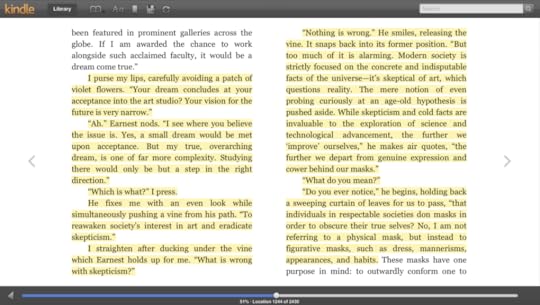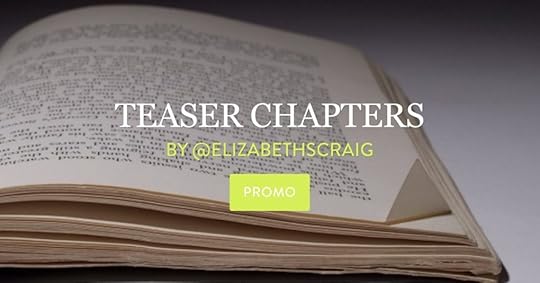Riley Adams's Blog, page 86
September 7, 2017
How Do I Make Dialogue Meaningful?
One of the most difficult aspects of writing a novel, or any narrative for that matter, is striking the delicate balance between dialogue and description. While insight into a character’s thoughts, emotions, and perceptions help shape the audience’s understanding of the character’s mind, dialogue aids readers in developing an accurate and full understanding of the character’s complete self. It offers an external glimpse into how a character moves, speaks, and reacts to the world surrounding them; dialogue is a character’s internal motives coming to life. Even so, it is difficult to develop a meaningful flow of speech which progresses the plot, rather than stagnating it.
Countless times while I have been writing, I will be immersed in the world of my own mind, putting down the situations being played out in my head by pen to paper, only later realizing that my dialogue loops in circles, or even worse, straying entirely from the point I am trying articulate.
How can I prevent this????
Thus, there are three necessary regulations dialogue must follow:
1) The dialogue must reveal a trait, secret, habit, or aspect of the character not revealed to the reader previously.
2) The dialogue must progress the plot.
3) The dialogue must divulge a philosophy held by the author or character, which is crucial to the narrative’s turning point.
Let’s take this highlighted passage below from my novel, The Power of Healing, to expound on these three points.
For context purposes, the excerpt above is a conversation between protagonist Charlotte Bell and her friend Earnest Heger as the two teenagers hike to a local water lily pond in the middle of the night, while discussing their plans for university. Earnest has just divulged that he hopefully aims to study art at the School of the Art Institute of Chicago and in return, skeptical Charlotte is incredulous at his whimsical goals. This passage is Earnest’s benign defense of his passion of art.
Firstly, does this dialogue reveal a personality trait of Charlotte’s? Yes, it does! Although Charlotte’s incessant pressing of what the “right direction” is; what “is wrong with skepticism;” and what Earnest means by “cower[ing] behind our masks;” obviously reveals her dubious nature, her three questioning interjections uncovers a softer side of her, which despite her hard skepticism of art and her friend’s lofty dreams, she is willing to further understand and accept Earnest’s desires. This barely perceptible crediting and embracing aspect of Charlotte is crucial to her growth as a character, which as she matures throughout the novel, aids her in blossoming into a young woman who admires Earnest’s passionate proclamation of the arts and deeply supports his calling as an artist.
Secondly, does this dialogue progress the plot? Absolutely! Despite Charlotte’s stubborn doubtful questioning of Earnest’s goals, Earnest’s patient explication of modern skepticism and its debilitating effect on the pureness of art, directly gestures to Charlotte herself, who is an unconscious slave to her societal mask. As a character embittered by her past, she constructs her world around her academic achievements and living solitarily. Yet, Earnest’s words are slowly peeling apart the layers of masks Charlotte has donned for years to hide her inner, vulnerable self.
Thirdly, does this dialogue divulge a philosophy crucial to the turning point of the plot? Yes! This is one of the first times in the novel for which the topic of masks arises; the reader begins to question if everything is truly as it seems. The passage discusses vulnerability and man’s misconception of believing that it is actually beneficial to assume a false identity in front of others. Later, we learn that Earnest is not Earnest’s real name; in actuality, he is Charlotte’s childhood friend, whose memory exists at the root of her pain. Earnest is a mask. Additionally, the reader thus also begins to look at themselves differently, internally reflecting on the own masks that he/she might don, which blinds them to their already beautiful identity.
Now that we have closely studied the three rules of meaningful conversation, let’s discuss how to put these in action.
In earlier drafts of The Power of Healing, I fell into the trap of making my dialogue too philosophical and blatantly ignoring the first two rules of meaningful dialogue; I wrote my dialogue more like an essay, rather than a story.
To prevent this, write your dialogue as a simple, flowing conversation you might have with a friend, teacher, superior, etc. Imagine yourself conversing with your character and how you might react and talk. Visualize the setting, and ponder your body language and the tone of your voice as you react to various utterances in the conversation. Write these into your narrative! The conversation between Charlotte and Earnest is peppered with actions the characters are doing as they make their way to the water lily pond (e.g., pushing vines out of their path, ducking the foliage, walking). Remind the reader that the world is still progressing and happening outside of this one moment in your story.
Do not forget that dialogue is a back-and-forth progression of the plot through words being spoken aloud by your characters. Use a character’s confusion to your advantage, as I did with Charlotte, in order for you to further explicate your point. Write from an emotion or a belief as you type your dialogue, and frequently interject with other character’s voices, questions, speculations, etc., to give the moment more depth and more opportunities for you to broaden your argument and further the point being made.
If you feel as if your dialogue is spinning in circles and diverging from the plot completely, take a step back and read over what you have written thus far. Sometimes, dialogue which initially seems to be a mess, can pose as an open door for you to extend your plot and explore another area of the story which you haven’t thought about. For example, when I was writing the conversation between Charlotte and Constantin, I never anticipated to draw a parallel between human nature and art on the succeeding page. Yet, through the discussion of masks and art’s ability to reveal one’s flaws, I was able to tie in a discussion on the so-called “perfect flaw” and segue into the authenticity of humanity.
Even so, at other times when a piece of dialogue strays from the plot too extremely, it is a warning sign to return to your notes on the character(s) in question and reassess their development. Re-brainstorm their beliefs and personalities, and rewrite their dialogue to match their whole beings. Most often, turbulent dialogue is a result of inconsistent character development.
With practice, you can find a balance in your writing and write meaningful dialogue! Above all, do not forget to visualize your dialogue as if it is a conversation happening in real time, and season it with insights into your characters and your views on the world. Enjoy!
About Hyu-Wai Loucks:
 Hyu-Wai Loucks (b. 1999) was born in Toronto, Canada, and moved to the States in 2002. She has loved literature her entire life. In third grade (2007), Hyu-Wai wrote her first short story and in fourth grade (2008), she received third place at a regional writing contest for her short story, “The Bubble-Gum Blower.”
Hyu-Wai Loucks (b. 1999) was born in Toronto, Canada, and moved to the States in 2002. She has loved literature her entire life. In third grade (2007), Hyu-Wai wrote her first short story and in fourth grade (2008), she received third place at a regional writing contest for her short story, “The Bubble-Gum Blower.”
In June 2017, Hyu-Wai’s first novel, The Power of Healing, was published by Books to Go Now. The Power of Healing was featured on June 7, 2017 by WCIA-TV. She is currently working on her next book.
Hyu-Wai graduated from high school in May 2017 and currently is a double-major in the social sciences and humanities at university.
Photo credit: pic fix via Visual hunt / CC BY-NC-ND
Writer Hyu-Wai Loucks with tips for meaningful dialogue:
Click To Tweet
The post How Do I Make Dialogue Meaningful? appeared first on Elizabeth Spann Craig.
September 2, 2017
Twitterific Writing Links
by Elizabeth S. Craig, @elizabethscraig
Twitterific writing links are fed into the Writer’s Knowledge Base search engine (developed by writer and software engineer Mike Fleming) which has over 40,000 free articles on writing related topics. It’s the search engine for writers.
Have you visited the WKB lately? Check out the new redesign where you can browse by category, and sign up for free writing articles, on topics you choose, delivered to your email inbox! Sign up for the Hiveword newsletter here.
Quick Update on a Recent Blog Post: Instafreebie
Instafreebie’s new iOs reading app has been released. More about the reading app and how it can help with discoverability here.
Additionally, Instafreebie has also just released a group giveaway interface. If you’re a writer who wants to find and join a group giveaway, you can now locate one through the Instafreebie site. More information on that can be found here.
I’ll be back on Friday with another post; I’m taking tomorrow off in observance of Labor Day. Hope everyone has a great week!
Business / Miscellaneous
Your Magic Bakery of Intellectual Property Rights: @DeanWesleySmith @thecreativepenn
Conferences and Events / Miscellaneous
Setting Your Goals for a Writing Conference: @Victoria_Noe
Creativity and Inspiration / Inspiration
Ambient sounds for writers: from 1000 Story Ideas
5 Habits to Keep Your Writing Fresh: @audreykalman @DIYMFA
Writing Prompt Generator: @thestoryshack
18 Things Every Young Writer Should Know: @chelspipp @BuzzFeed
Creativity and Inspiration / Inspiration / Reading as Writers
9 Inspiring Survival Stories for Fans of Dunkirk: @EarlyBirdBooks
5 Books About Strange Cities: @ghostfinder
Creativity and Inspiration / Productivity / Fitting in Writing
Author @Colleen_M_Story gives writers 5 ways to slow down time for better writing sessions:
Tips for more consistent writing: @_FYWH
Creativity and Inspiration / Success
Eclipsing Your Writing: @Lindasclare
11 Steps to Set Up Pre-Orders on Smashwords: @lornafaith
Creativity and Inspiration / Writing Life
Healing, Chapter by Chapter: How Writers Tap into Their Own Grief: @emilyacolin
Writing and the Creative Life: Why Creative People May Feel More Anxiety: @GoIntoTheStory
The Life Expectancy of a Novel: @GiveMeYourTeeth
How Writing Let 1 Writer Take Control of Her Own Story: @jennie_melamed
Genres / Fantasy
Fantasy Writing: 5 Ways to Fight Like an Elf: @mattstaggs @unboundworlds
19 Top Urban Fiction Publishers: @rororella @writingtipsoasi
How to Make a Clichéd High Fantasy Cover: @NicolaAlter
5 Shows That Prove You Love Urban Fantasy — and What to Read After Watching: @ChelseaVBC
Genres / Historical
There’s No Such Thing As Historical Fiction: @paullynchwriter @lithub
Historical Research for Writers: @TheMerryWriter
Genres / Miscellaneous
4 Resources for Women Interested in Travel Writing: @AllisonBYates
Genres / Mystery
Governing boards as elements in crime fiction: @mkinberg
Crime writing: shoot to kill or wound? @LeeLofland
8 Key Traits of Highly Effective Detectives: @JChaseNovelist
Longing to be someone else as an element in crime fiction: @mkinberg
Crime writing: evaluating threats as a police officer: @LeeLofland
Dutiful relationships in crime fiction: @mkinberg
Genres / Picture Books
Finding and Working with an Illustrator for Your Children’s Picture Book: @IndieKidsBooks
Genres / Romance
In Defence of Romance – How to Handle Coming Out of the Romance Writer’s Closet: @lansi26
Genres / Screenwriting
How to Write a Screenplay in 30 Easy Steps: @CockeyedCaravan
Dunkirk vs. Saving Private Ryan: What’s Your Screenplay About? : @jacobkrueger
Promo / Book Descriptions and Copywriting
A fill-in-the-blank formula could be the start of a great book blurb: @EbooksAndKids
Promo / Book Reviews
How To Get Book Reviews As An Unknown Author: @JasonBLadd @thecreativepenn
Promo / Box Sets
A Series of Posts on Publishing a Box Set on Amazon: @sallyjenkinsuk @nickdaws
Promo / Miscellaneous
13 Ways To Help An Indie Author With Their Book Release: @HelenScheuerer
Polarities Of Book Marketing. Where Do You Sit On The Scale? @thecreativepenn
Diary of a Book Marketing Plan – Setup: @ZoeMMcCarthy
Promo / Newsletters
Building an Email List for Your Book: 2 Effective Tactics to Try Now: @EmilyWenstrom
Promo / Social Media Tips
Starting a book? Start your author platform now: @ZaraAltair
Tips for growing your Twitter followers: @CaballoFrances
Promo / Websites
Your contact page: @Janet_Reid
Writing a feature article for your media kit: @BuildYourBrandA
Publishing / Miscellaneous
5 Things Everybody Gets Wrong About Interactive Books: @maifosz @publishdrive
Simon & Schuster Offers Books for Storm-Stricken Texas @Porter_Anderson
Producing Your Books in Audio: Picking Your Narrator: @AngelaQuarles
The Coveted Book Table: How Those Books Get There: @NewShelvesBooks
Publishing / News / International Publishing
Rights Tips: German Children’s Books to Watch for at Frankfurt: @Porter_Anderson
Industry Notes: EC Chooses Spain’s Odilo; Quarto Breaks Off Talks: @Porter_Anderson
Rio’s Biennial Book Fair Prepares Its Agents & Business Center: @Porter_Anderson
OpenBook’s China Bestseller Lists for July 2017: Fiction and Nonfiction: @Porter_Anderson
Birkbeck’s ‘Mechanics’ Institute’: ‘Showcasing New Voices’ in the UK: @Porter_Anderson @JuliaBell
Singapore’s SnapLearn Brings AR and VR to Books: @Porter_Anderson @pubperspectives
Freedom to Publish: Romania May Allow Only One Textbook Publisher: @Porter_Anderson @pubperspectives
Kalimat Foundation’s Ara Initiative Helps Sight-Impaired Children Read: @Porter_Anderson
Politics and France’s Reading Culture: @FabricePiault @Porter_Anderson
UK Author-Illustrator Judith Kerr Now Platinum Bestseller: @Porter_Anderson @pubperspectives
Publishing / Options / Self-Publishing
Free Webinar: How to Self-Publish Your Illustrated Book: @ReedsyHQ
Publishing / Options / Traditional Publishing / Pitches
A Guide to #PitchWars & #PitMad: @brendadrake
Publishing / Options / Traditional Publishing / Querying
The Broken Query System: @wendylawton
Is This MG Science Fiction Query Letter Working? @Janice_Hardy
Publishing / Options / Traditional Publishing / Rejections
What Creative Icons Can Teach You About Rejection: @Bang2write
How To Survive Having Your Writing Rejected: by Paige Duke @standoutbooks
Publishing / Process / Formatting
Ebook Formatting Tips: @SpunkOnAStick @TheIWSG
Writing Craft / Beginnings
Make Your Opening Grand: @tinaannforkner
Writing Craft / Chapter Endings
Starting and Ending Chapters: @AJHumpage
Writing Craft / Characters / Development
8 Character Development Exercises to Help You Nail Your Character: @ReedsyHQ
7 Key Traits of Enduring Characters: @ev_scarlett
How to Write Characters Who Don’t All Feel the Same: @Janice_Hardy
How Relatable Character Relationships Will Make or Break Your Story: @RuthanneReid
Writing Craft / Characters / Protagonists
Writing a Compelling Hero: 7 Tips With Examples: @_HannahHeath
5 Tropes That Make a Protagonist Boring: by Oren Ashkenazi @mythcreants
Writing Craft / Dialogue
Dialogue: 10 Ways to Make it Real: @JordanDane
Writing Craft / Diversity
White Writers Writing Non-White Characters: @EllieStephens5
Writing Craft / Miscellaneous
A Simple Technique to Improve Your Writing in 10 Minutes a Day: @newleafwriter @AngelaAckerman
The value of capturing family histories: @gmartin70
Writing Craft / POV
A Tip for Writing Multiple Points of View: @MarchMcCarron
Blowing Up Your Point Of View: @jeanne_harrell
Writing Craft / Pre-Writing / Plotting
Cinematic techniques for writing fiction: @Lindasclare
Every Good Book is a Mystery, Even When it’s Not: @msheatherwebb
Writing Craft / Pre-Writing / Research
Research: Why You Must Leave Awesome Things Out Of Your Book: @ellajoyolsen @WomenWriters
Writing Craft / Punctuation and Grammar
3 Cases of Nonequivalent List Items: @writing_tips
Writing Craft / Revision
What does the word STET mean? @pubcoach
How to Take Edits 101: @ChristophPaul_
5 Reasons Your Novel Needs a Developmental Edit: by Jonathan Vars
Writing Craft / Revisions / Critiques
The beta reading process: 10 critical steps: @kseniaanske
Writing Craft / Settings and Description
Curing White Room Syndrome: How to Ground Your Reader: @RDCwrites
Using Body Language in Your Novel—Legs, Feet, and Bonus Tips: @SKathAnthony
Writing Craft / Word Crafting
Saying What You Mean: Controversial Language in Fiction: by Cait Reynolds @KristenLambTX
Writing Tools / Miscellaneous
What Smart Writers Spend Their Money On: @colleen_m_story
The top writing links from last week are on Twitterific:
Click To Tweet
The post Twitterific Writing Links appeared first on Elizabeth Spann Craig.
August 31, 2017
Teaser Chapters
by Elizabeth S. Craig, @elizabethscraig
Back when I was writing the Southern Quilting Mysteries for Penguin Random House (I’m writing the series independently now), I knew that I would need to have to have a teaser chapter ready for the next book in the series by the time the current book was in production.
This was a bit of a challenge for several reasons. For one, I knew the next book in the series wouldn’t be coming out for a year. That’s the way traditional publishing worked. For another, it required me to already have an outline in place for the next book. For another, I knew that Penguin Random House wouldn’t want any major changes in that chapter–I needed to have a lock on the character names, etc.
Their focus at the time was mainly still print. The teaser chapter was a gimmick from an earlier day in the print world.
I’ve used teaser chapters in my self-published books in the past, but now I’ve moved away from the practice…mainly because I’m not wild about teaser chapters as a reader. Since I read most books digitally, a teaser chapter at the end of a book can make me think that I have more of the book to read than I do. Besides, reading a teaser for a book that hasn’t yet been published can be frustrating.
Maybe back cover copy would be better. Wouldn’t use up as much room. Or even something like “Next book is “Title.” For updates on the story as I write it, subscribe to my newsletter at _______.
Here are my thoughts currently on the better use of teaser chapters:
If we do include a teaser at the end of the book, consider making it a short one so that readers won’t think they have a lot of book left to read.
Perhaps we should be sensitive to readers and not include a teaser chapter if the book’s release is anticipated to be many months or a year away.
To reach more readers (and not irritate them by including a teaser for a book that won’t come out for a long while), we could consider trading short teasers with another author in the same genre (for their completed book).
Or, if we write more than 1 series, put a short teaser of the first book in the other series in the back.
If we put a buy-link in that we can track (through bit.ly, etc.), we can assess how well the teaser is working.
Do you use teaser chapters in your books? What are your thoughts on them, as a reader?
Thoughts on teaser chapters:
Click To Tweet
The post Teaser Chapters appeared first on Elizabeth Spann Craig.
August 27, 2017
How to Slow Time for More Relaxed, Creative Writing Sessions
by Colleen M. Story, @Colleen_M_Story
“Oh, I want to write today, but I just don’t have the time!”
You’ve probably felt this way more than once. In fact, if you’re like many of us in today’s world, you’re feeling frequently pressed for time, and like you just can’t find enough of it—especially for writing.
The bad news is that when you’re constantly under the gun, creativity suffers. In a 2002 study, researchers analyzed more than 9,000 daily diary entries from people who were working on projects that required high levels of creativity. They found that stress, in the form of time pressure, resulted in less creative projects.
“When creativity is under the gun,” the authors wrote, “it usually ends up getting killed.”
The good news is that you don’t have to feel this way. Here are five tips that can help you slow your perception of time so that when you do get a moment to write, you can approach it with a calm, relaxed state of mind.
Slow down your movements.
When we feel rushed and behind, our movements are typically quick, jerky, and fast. This is why when we’re stressed out, we tend to hurt ourselves. We run into things, hit our heads, and trip and fall more often.
My dad used to say, “The hurrier I go, the behinder I get.” Whenever you hurry, you not only stress yourself out, you also increase your risk of making mistakes, missing something, or even causing an accident.
Try this: When you sit down to write, make a conscious effort to slow down your movements. Imagine yourself in a slow-motion replay. Focus on each step that you take, from turning on the computer or laptop to clicking open the file to reaching over to pick up your glass of water to raising it to your lips. Give yourself 1-2 minutes to exaggerate all these movements.
Feeling constantly behind the clock is a feeling, one you can control by your thoughts. When you purposely slow your physical motions down, you signal your brain that you have plenty of time, which helps you to feel more relaxed. (After a couple minutes feel free to go back to normal speed!)
Prioritize.
If you’re feeling constantly pressed for time, you may be trying to meet too many deadlines. Perhaps you’re a perfectionist and you have difficulty letting some things go. You can slow things down in your life and create more relaxed writing sessions by prioritizing the important activities in your day.
“Excessive time-urgency is a problem in thinking,” says Michael Ashworth, Ph.D. over at PsychCentral. “Everyone has some pressure to get things done. However, if you consider everything is equally urgent, you’re likely to experience stress problems.”
Choose three things you absolutely must get done and get done well, and focus on those. (Writing is probably one of them.) For everything else, simply do the best you can and then let it go.
Call out the negative thoughts.
Positive thinking promotes creativity and productivity. Negative thinking, on the other hand, kills both. Unfortunately, when you’re feeling rushed, you’re not likely to approach the page with positive emotions.
The second you notice thoughts in your head like, “I’m behind,” or “I don’t have time to write” or “I’m not going to get anything done today,” state those thoughts out loud. Notice how these thoughts make you feel—how they contribute to your tight stomach, your tapping foot, and your feeling of being defeated.
Simply giving voice to these thoughts can immediately reduce your stress levels. According to a 2007 study in which researchers monitored brain activity via MRIs, simply labeling how you feel in this way can diminish the response of the amygdala and other limbic regions, reducing the stress response.
Calling out these “rushed” feelings can also help you replace them with calmer thoughts. Even if you have only 10 minutes to squeeze in a bit of writing, tell yourself that you have plenty of time and that everything is okay. These sorts of thoughts are more conducive to creativity, and will help you make the most of the time you do have.
Face your fears.
When you feel rushed to get your writing done, realize that fear may be contributing to that feeling. You may be pushing yourself to get the next book out there or to meet a self-imposed deadline because you fear falling behind or losing the attention of your readers.
Bringing your expectations for your writing into your writing sessions is a surefire way to increase fear and stress, and make you feel like you don’t have enough time to “write well.” Many times, these feelings will cause you to skip your writing session entirely.
When it’s you and the blank page, try to forget about your expectations for the work and just focus on the work itself. Allow yourself to relax and have fun, and don’t let outside concerns to tread on the sacred space that is your writing.
Bring your full attention to the task.
The level of attention applied to a task can also make a big difference in how long it seems to take. Studies show that paying more attention to what you’re doing slows time perception down. That means if you can focus your thoughts exclusively on your story, you can create a more relaxed writing session.
In a 1985 study, for example, researchers found that the more difficult the task, the worse students were at accurately judging how much time had passed. They found similar results in 2010, and theorized that because more of the brain was involved in the task, less was available to accurately judge the passing of time.
How fast or slow time goes is often completely about your perceptions. You know how quickly it can fly by when you’re spending time with a good friend, right? Yet if you’re standing in line at the grocery store, five minutes can seem like an eternity.
You can use this to your advantage. Say you have only 15 minutes to write. Tell yourself you’re going to slow that 15 minutes down so it feels more like 30. Imagine you’re in a fantasy world where that is possible, and then set a timer so you don’t have to watch the clock.
Next, bring your full attention to the task. Focus only on your story, blocking everything else out and expecting that you have plenty of time. You may be amazed at what you can get done.
Create a New Mindset
Our world travels fast these days, but if you think it’s all because of technology or today’s society that you feel rushed, consider this: In 1979, professor emeritus at the Free University in Amsterdam Bob Goudzwaard wrote about “scarcity of time” in his book, Capitalism and Progress.
“Nearly everyone in western society suffers from a frightful shortage of time,” he wrote. “This lack of time is apparent not only from the quick tempo of our lives and from our crowded schedules, but also from the manner in which the modern family spends its time.”
Remember—this was long before smartphones, and even before most people had computers in their homes, and still people felt pressed for time. So it’s not necessarily modern-day technology that’s causing you to feel this way (though of course it doesn’t help).
Instead, it could just be how you’re looking at things. Today, during your writing session, see if you can allow yourself to believe that you have plenty of time, and all you have to do is relax and create. You may be amazed at how much it helps.
How do you slow time down for your writing sessions?
 Colleen M. Story is the author of Overwhelmed Writer Rescue: Boost Productivity, Improve Time Management, and Replenish the Creator Within—a motivational and inspiring read full of practical, personalized solutions to help writers escape the tyranny of the to-do list and nurture the genius within. Discover your unique time personality and personal motivational style when you get your copy from Amazon and other common book retailers. Enjoy your free chapter here!
Colleen M. Story is the author of Overwhelmed Writer Rescue: Boost Productivity, Improve Time Management, and Replenish the Creator Within—a motivational and inspiring read full of practical, personalized solutions to help writers escape the tyranny of the to-do list and nurture the genius within. Discover your unique time personality and personal motivational style when you get your copy from Amazon and other common book retailers. Enjoy your free chapter here!
Colleen has worked in the creative writing industry for over twenty years and is the founder of Writing and Wellness (writingandwellness.com). For more information, please see her website (colleenmstory.com), or follow her on Twitter (@ colleen_m_story).
Author @Colleen_M_Story gives writers 5 ways to slow down time for better writing sessions.
Click To Tweet
Sources
Amabile TM, et al., “Creativity under the gun,” Harvard Business Review, 2002; 80(8):52-61, 147, http://europepmc.org/abstract/MED/12195920/reload=0;jsessionid=fObN5ldi38y4x7wKcTqQ.18.
Michael Ashworth, “Always in a Rush? Maybe it’s Time-Urgency,” PsychCentral, May 17, 2016, https://psychcentral.com/lib/always-in-a-rush-maybe-its-time-urgency/.
Matthew D. Lieberman, et al., “Putting Feelings Into Words,” Psychological Science, May 1, 2007; 18(5): http://journals.sagepub.com/doi/abs/10.1111/j.1467-9280.2007.01916.x.
Goudzwaard, B., and Josina Van Nuis Zylstra. Capitalism and Progress: A Diagnosis of Western Society. Toronto, Canada: Wedge Pub. Foundation, 1979.
Brown, Scott W. “Time perception and attention: The effects of prospective versus retrospective paradigms and task demands on perceived duration.” Perception & Psychophysics 38, no. 2 (1985), 115-124. doi:10.3758/bf03198848.
The post How to Slow Time for More Relaxed, Creative Writing Sessions appeared first on Elizabeth Spann Craig.
August 26, 2017
Twitterific Writing Links

by Elizabeth S. Craig, @elizabethscraig
Twitterific writing links are fed into the Writer’s Knowledge Base search engine (developed by writer and software engineer Mike Fleming) which has over 40,000 free articles on writing related topics. It’s the search engine for writers.
Have you visited the WKB lately? Check out the new redesign where you can browse by category, and sign up for free writing articles, on topics you choose, delivered to your email inbox! Sign up for the Hiveword newsletter here.
Business / Miscellaneous
How to find and hire an editor: @pubcoach
Why Artists need to Pay Their Collaborators: @DrewChial
Pros and Cons of Fighting Book Piracy: @111publishing
How An Internship Really Works for Writers: @crazyauthorgirl
How to Ask To Pick Someone’s Brain: @KateMoretti1
Creativity and Inspiration / Inspiration
Step out of your comfort zone for creative inspiration: @GarryGarrettRya
Creativity and Inspiration / Inspiration / Reading as Writers
10 Essential Road Trip Books That Aren’t ‘On the Road’: @knownemily
5 Horror Reads to Keep the Sunshine Away: @tdelucci
Creativity and Inspiration / Motivation
Writing Through the Dog Days: @Lindasclare
Dumb Little Writing Tricks That Work: Snacks: @GoIntoTheStory
5 challenges facing writers: @amabaie
3 Ways Writers Can Find Creative Flow: @lornafaith
Plotting for Pantsters: @beccapuglisi
“Whatever you are doing, be fully engaged in it”: @DanBlank @mrjakeparker
Creativity and Inspiration / Productivity / Fitting in Writing
When Life Throws Your Writing Routine Off Balance, Remember 3 Things: @gmyrthilbooks
34 Ways to Deliberately Grow Your Writing Practice: @reallucyflint
Creativity and Inspiration / Productivity / Writing Quickly
Why tracking makes you a more productive writer: @beprolifiko
Creativity and Inspiration / Writing Life
Get that Creative Euphoria Without Alcohol or Drugs: @colleen_m_story
The Writer’s Discomfort Zone: How to Survive and Thrive: @RuthHarrisBooks @annerallen
6 Exciting Career Paths if Freelance Writing Isn’t For You: @aliventures
10 Ways To Be A Happy Writer: @10MinNovelists
How to Deal with People Who Don’t Support Your Writing: @SeptCFawkes
How to Get What You Really Want Out of Your Writing Career: @colleen_m_story
Shifting Priorities and the Writing Gig: @OrlyKonig
Genres / Dystopian
We Need Stories of Dystopia Without Apocalypse: @EmmalieDropkin
Genres / Fantasy
5 Ways To Incorporate Multiple Languages Into Your Fantasy Novel: @kj_bags
Stop Erasing Women’s Presence in SFF: @hawkwing_lb
Must Fictional Parents Always Be Absent? @NicolaAlter
Genres / Horror
8 Overlooked Moments in Classic Horror Movies: by Nathaniel Brehmer @WickedHorrorTV
Genres / Memoir
Memoir or Fiction? Which is better for telling your own life story? @annerallen
What to Share When Writing a Memoir: @brooke_warner
Genres / Mystery
Wildlife Forensics: @FionaQuinnBooks @SueColetta1
Crime Writing: Peanut Butter Can Kill You: @DPLyle
Examples of both classic and modern film noir: @mkinberg
Genres / Non-Fiction
On writing a book where you can’t make things up: @Roz_Morris
Genres / Romance
How to Write Romance Beats with Gwen Hayes: @gwenhayes
Genres / Science Fiction
5 Books That Resemble Science Fiction: @KarenHeuler
Promo / Ads
The Basics of Advertising for Indie Authors: @MarcyKennedy
Promo / Blogging
10 Reasons to Start an Author Blog: @annerallen
7 Steps to a User-Friendly Blog: @Dwallacepeach
Promo / Book Reviews
3 Ways Indie Authors Deal with “Non Verified Reviews”: @Naked_Determina
The Top Two Reasons a Reader Will Leave a Bad Review: @SloanTamar
Promo / Miscellaneous
10 marketing tips for self-published authors: @alisonbav @publishingtalk
Promo / Newsletters
New Feature from @instafreebie :Double Opt-ins for Readers:
Promo / Platforms
Author Platform: Done It vs Gonna Do It: @behlerpublish
Wattpad’s New Video App, Raccoon, Launches in the US Today: @ivanyuen @porter_anderson
Promo / Social Media Tips
So You’re an Author Without a Social Media Presence: Now What? @JaneFriedman
How to Create a Facebook Live Show: @JuliaBramble
Publishing / Miscellaneous
McGraw-Hill and iFlipd Pilot a Textbook Rental Program: @Porter_Anderson @iFlipd
Publishing / News / Amazon
Why 1 Writer is Leaving KDP: @KristaLakes
Publishing / News / International Publishing
‘Bigger, Broader’: The German Book Prize Releases Its 2017 Longlist: @Porter_Anderson
Cambridge Uni Press Censorship Turnaround; Unicorn UK-China Deal @Porter_Anderson @pubperspectives
Tel Aviv’s Stephanie Barrouillet Offers Work from Turkey and France: @Porter_Anderson
Canadians’ Reading Habits: BookNet Sees Smartphone Reading Rising: @Porter_Anderson @BookNet_Canada
Publishing / Options / Self-Publishing
For New Indie Authors: What 1 Author Would Do if Starting Today: @GoblinWriter
6 Tips for Successful Self-Publishing Outside Your Home Country: @maifosz @thecreativepenn
Publishing / Options / Traditional Publishing
5 Things Learned About Being a Pre-Published Debut: @jules_writes
How to Survive a Long Production Cycle: @MichaelHaspil
Patience in Publishing: @HannahFergesen
Publishing / Options / Traditional Publishing / Pitches
5 Steps To The Perfect Elevator Pitch: @Bang2write
Publishing / Options / Traditional Publishing / Querying
Writing Queries That Get Read: @ZoeMMcCarthy
Publishing / Process / Book Design
9 Ways To Get The Very Best Out Of Your Book Cover Designer: @damonza123 @thecreativepenn
Publishing / Process / Formatting
Tips for Formatting An eBook: @RachelAmphlett
Publishing / Process / Legalities
The Truth Behind Popular Copyright Myths: @susanspann
Getting rights back from our publishers:
Writing Craft / Beginnings
How to Hook a Reader and Leave Them Hungry for More: @Kid_Lit
Writing Craft / Characters / Arc
3 Reasons You Don’t Need a Character Arc: @Janice_Hardy
Writing Craft / Characters / Emotion
Write Emotionally Engaging Characters: @authornordin @lornafaith
Writing Craft / Common Mistakes
“3 Tips From My Failure As An Author”: @KelsieEngen
Writing Craft / Conflict
Conflict: Why It Isn’t Just about Fighting: @Janice_Hardy
Writing Craft / Dialogue
Avoiding Stilted Dialogue: @ml_keller
Writing Craft / Drafts
The Semi-No-Fail Way to Fast Drafting for People Who Hate Drafting: @candylandgang
Writing Craft / Flashback and Back Story
Raise a Question, Earn the Backstory: @kcraftwriter
Writing Craft / Lessons from Books and Film
Nolan’s “Dunkirk”: 5 Writing Tips About Stories Based on Historical Events: by Jonathan Vars
Watch Movies Like a Writer: @Lindasclare
Writing Craft / Literary Devices
How to Manage Expectations (aka Tone): @CockeyedCaravan
Writing Craft / POV
Should I use 3rd Omniscient within 3rd Limited? @p2p_editor
Writing Craft / Pre-Writing / Outlining
Defusing Outlining Confusion: @MirandaNading @RomanceUniv
An Easy Guide to Outlining Your Novel: @TashaSeegmiller
Writing Craft / Pre-Writing / Plotting
5 Tips for Writing Better Subplots: @nownovel
Dawn of the Planet of the Apes Beat Sheet: @CDavidMilles
Writing Craft / Pre-Writing / Story Concept
3 Clever Ways to Write What You Know: @Jffelkins
Writing Craft / Punctuation and Grammar
8 Infographics That Will Help You Improve Your Writing: @Bang2write
3 Types of Erroneously Located Modifiers: @writing_tips
Writing Craft / Series
The Ingredients of a Great Series Character: @jamesscottbell
Writing Craft / Settings and Description
Why 1 Writer Favors Real Settings: @pamelameyers
Writing Craft / Synopses
Getting Characters into Your Synopsis: by Suzanne Purvis
Writing Craft / Tension
How to Create Drama in Fiction: @AJHumpage
Writing Craft / Transitions
Creating Effective Transitions: @woodwardkaren
Writing Craft / Word Crafting
5 Poetic Tools to Enhance Your Prose: by Elise Holland @DIYMFA
Writing Tools / Apps
3 Tips for Using the Corkboard Function in Scrivener: @aprildavila
Writing Tools / Resources
The Ending: Writing Worksheet: @EvaDeverell
Book Marketing & Book PR Toolkit: @ThePRExpert
Uncategorized
How to Be a Writer on Social Media: @pronounced_ing @rgay @AdamMGrant @alexanderchee
Beginner Writing 101: Types, How-To & Expert Tips: @Hobbiesphere16
The top writing links from last week are on Twitterific:
Click To Tweet
The post Twitterific Writing Links appeared first on Elizabeth Spann Craig.
August 24, 2017
Comfort Zones and Writing
If you venture out of your comfort zone and can’t find your way back, maybe it’s all good.
by Garry Ryan, @GarryGarrettRya
This story probably began in Singapore. I spent the last two years of high school in a sweaty multicultural concoction of diverse languages, foods and monsoons. It was jarring and I had to adapt. An unexpected dividend was the ability to become a student of the inner workings of societies.
Back in Canada, the kindness of Casey and Pablo exposed me to First Nations’ perspectives. Sometimes the intense heat of a Blackfoot sweat lodge left burns on my shoulders. It also allowed me to see – with more clarity – the connections between humans.

Sitting still for hours in the southern California heat is extremely uncomfortable. Photographing hummingbirds revealed how their beauty, competition and aggression are actually reflections of human behaviour.
Havana, Cuba was old and new shoved up against one another in a way I hadn’t experienced. The outcome was a novel (Matanzas) about Cuban and Canadian cultures dancing with one another.
Seeing the remnants of Mayan civilization at Chichenitza was another of those mind-altering experiences. It required pushing a wheelchair in plus thirty temperatures while learning secrets about the way Mayan architects played with sound.
Travelling one thousand kilometres in one day is gruelling. Yorkton, Saskatchewan unexpectedly provided the backstory for a new character I’ve been working with. She came to life while I was searching for a cup of coffee.
Calgary’s 2013 floods have influenced a novel about the way a city can come together after a disaster.

Even an idyllic San Jose setting can help you to imagine a scene where beauty and ugliness are shoved up against one another.
You may see potential scenes in out of the way locations. If you carry a smartphone with you, it will always be possible to catalogue evocative images for later use.
 In 2004, NeWest Press published Garry Ryan’s first Detective Lane novel, Queen’s Park. The second, The Lucky Elephant Restaurant, won a 2007 Lambda Literary Award. NeWest has since published seven more titles in the series: A Hummingbird Dance, Smoked, Malabarista, Foxed, Glycerine, Indiana Pulcinella and soon to be released Matanzas. In 2009, Ryan was awarded Calgary’s Freedom of Expression Award. In 2012 a second series, the historical fiction novel Blackbirds, was published by NeWest Press.
In 2004, NeWest Press published Garry Ryan’s first Detective Lane novel, Queen’s Park. The second, The Lucky Elephant Restaurant, won a 2007 Lambda Literary Award. NeWest has since published seven more titles in the series: A Hummingbird Dance, Smoked, Malabarista, Foxed, Glycerine, Indiana Pulcinella and soon to be released Matanzas. In 2009, Ryan was awarded Calgary’s Freedom of Expression Award. In 2012 a second series, the historical fiction novel Blackbirds, was published by NeWest Press.
Step out of your comfort zone for creative inspiration (by @GarryGarrettRya )
Click To Tweet
The post Comfort Zones and Writing appeared first on Elizabeth Spann Craig.
August 20, 2017
Thoughts on Getting Rights Back
by Elizabeth S. Craig, @elizabethscraig
Many times in the past five years, I’ve heard from traditionally-published writers who want to get the rights back to their characters and story worlds for their backlist books.
I’ve also heard from writers who’ve had a hard time getting a rights reversion granted by their publishers.
Some writers weren’t exactly sure what they wanted to do with their rights. They only knew that they’d been told that they should try to have them reverted.
Yes. If you’ve been traditionally published and your series has been dropped by your publisher, you should try to get your rights back.
Things you can do with your book when you have rights back:
Publish prequels or sequels to books. Publish spin-offs where supporting characters now have their own stories.
Put your books up for audition on ACX for audio.
Have your books translated into other languages on Bablecube or similar sites.
Expand into hardcover for the library or collectors’ market. Expand into digital if your books are older. Have your books available in paperback again.
Make your books available overseas in English by using aggregator sites like Draft2Digital, Smashwords, PublishDrive, or StreetLib.
The process is fairly simple, at least at first:
Review your contract. What rights did you sign over to your publisher?
If you need help understanding your contract, there’s a nifty PDF that’s available from Authors Alliance (and Berkeley Law). You can download it for free, although they do ask for a donation of $20 (which is not required, however, only suggested).
Some pertinent chapters:
Are You Eligible to Revert Rights Under the Terms of Your Contract? 40
Does Your Contract Have a Reversion Clause? 42
What Conditions Must Be Met Before You Can Exercise Your Reversion Clause? 45
Have the Conditions of Your Reversion Clause Been Met? 49
Write to your publisher:
My email, asking for my audiobook rights for my Southern Quilting mysteries, looked like this:
Dear Subrights Department,
I’m writing to request a reversion of unexploited audiobook rights for the Southern Quilting Mysteries (cozy mysteries formerly with Obsidian). These include Quilt or Innocence (2012), Knot What it Seams (2013), Quilt Trip(2013), Shear Trouble (2014), and Tying the Knot (2015).
The original contract was signed Feb. 10, 2011.
Please send written confirmation of reversion of the audiobook rights to me at this email address or at my home address of ________. I can be contacted by phone at _______ to answer any questions.
In my email, I was specific as to the rights I wanted reverted, and I named each publication. I was polite. I gave them a date in case they needed extra help locating the contract. It would have been better if I’d had a name to work with, but unfortunately the switchboard at Penguin Random House appeared to be overwhelmed when I called in, so an email address was the best I could get.
What happens if you run into issues? If your contract doesn’t address reversion rights or if your publisher balks at reverting them? Writer and publishing attorney Susan Spann (no relation to me) in her Jan. 2016 post for Writer Unboxed (Obtaining Reversions of Publishing Rights: the Good, the Bad, & the Ugly) suggests that we contact a publishing attorney. Additionally, she states (all emphasis hers):
” Consult a Publishing Attorney. If the contract doesn’t grant you obvious termination rights and the publisher refuses a polite request for termination and reversion, there may still be creative ways to obtain termination of the contract and reversion of publishing rights.
However, in most cases the author’s right to terminate a contract and obtain a reversion of publishing rights is limited by the language in the agreement. If the contract doesn’t grant you termination rights, and publisher isn’t in breach, your options may well boil down to persuading the publisher to agree to termination—or waiting until the contract allows you to terminate without the publisher’s consent.”
I’ve also been asked if it’s been hard to not have the digital rights for my first book in my Myrtle Clover series (Midnight Ink holds the ebook rights). In some ways, yes. But because my books are written as stand-alones with no real story arc between books, it’s been easier. I don’t have the first book included in my first box set, but readers have never complained about that.
Other writers might get around this issue by creating a prequel trilogy and have a box set of those. Or have a novella prequel that could work as a permafree introduction to the series.
At any rate–why not see what you can get? With any luck, it will only be a matter of pulling out your contract and writing an email.
Have you asked for a rights reversion? Have you got a series that’s partially trad-pubbed and partially self-pubbed? How has that worked for you?
Thoughts on getting our rights back from publishers:
Click To Tweet
The post Thoughts on Getting Rights Back appeared first on Elizabeth Spann Craig.
August 19, 2017
Twitterific Writing Links

by Elizabeth S. Craig, @elizabethscraig
Twitterific writing links are fed into the Writer’s Knowledge Base search engine (developed by writer and software engineer Mike Fleming) which has over 40,000 free articles on writing related topics. It’s the search engine for writers.
Have you visited the WKB lately? Check out the new redesign where you can browse by category, and sign up for free writing articles, on topics you choose, delivered to your email inbox! Sign up for the Hiveword newsletter here.
Business / Miscellaneous
A Step-by-Step Guide to Setting Up Your Freelance Writer Website: @TalValante
Conferences and Events / Miscellaneous
How Not to Hold an Author Event: @drewchial
Creativity and Inspiration / Inspiration
On publishing another book when there are already so many: @Roz_Morris
Want to be an artist? Watch Groundhog Day: @austinkleon
Creativity and Inspiration / Inspiration / Reading as Writers
8 Famous Writers Writing About Not Writing: @knownemily
5 Ways to Use the Library to Nurture Your Reading Life: @librarylore @DIYMFA
Reading Outside Your Comfort Zone: @WilsonTheWriter @LitReactor
8 Books That Blend Science and Magic, Minus the Fantasy Tropes: @marthawells1
5 Nonfiction Books for Writers in an Emergency: @estepnagy @The_Millions
Creativity and Inspiration / Motivation
The Midstream Temptation: @jamesscottbell
4 Tips for Writing Accountability: @EngageReadersBk
Creativity and Inspiration / Productivity / Fitting in Writing
How Can You Keep Writing if You Work Long Hours? Tips: @aliventures
Is writing each day important? @WritersCoach
Creativity and Inspiration / Productivity / Writer’s Block
How You’ll Recover From Writer’s Block: @RuthanneReid
Creativity and Inspiration / Productivity / Writing Quickly
3 Ways Practicing Detachment Can Promote Writing Productivity: @copybyerika
5 Rules to Increase Your Productivity Fast: @lornafaith
Creativity and Inspiration / Success
How to Go Beyond Your Voice to Make Your Novel Shine: @JadieJones1 @colleen_m_story
Creativity and Inspiration / Target audience
9 Keys to Clarifying Target Market: @LisaTener
Creativity and Inspiration / Writing Life
A School Librarian Who Thinks Outside the Box to Encourage Kids to Read: @angieinlibrary @aasl
Why Some People Don’t Support Your Writing Goals: @SeptCFawkes
9 Steps to be happy with your novel: @DNathanWriter
A School Librarian on How to Reach the Dormant Readers: by Sara Stevenson @aasl
It’s Just Books: 5 Reasons It’s Okay to Quit Writing: @brbjdo @LitReactor
The “Terrifying Crisis” of Finding the Second Act to a Writing Career: @tgwood505 @DanBlank
The Intimacy of Writing in the Second Person, in a Bar: @maireadsmst
Genres / Fantasy
The Persistence of American Folklore in Fantastic Literature: @NB_Chris @tordotcom
A Guide to Sci-Fi and Fantasy Subgenres: by Haley Larson @UnboundWorlds
Genres / Memoir
An agent on non-commercial memoir: @janet_reid
Genres / Mystery
‘Friends’ Who Can’t Be Trusted as Elements in Crime Fiction: @mkinberg
Crime Writing: Complacency Kills Cops: @LeeLofland
Genres / Non-Fiction
A Reading List for Stronger Creative Non-Fiction: @kayladeanwrites
Genres / Poetry
How to Read Poetry: @WritingForward
Genres / Science Fiction
5 Kinds of Stories You Can Tell With a Lost Spaceship: by Stubby the Rocket @tordotcom
Genres / Screenwriting
How to Write a Comedy Script: by Paul Keegan @writingtipsoasi
Genres / Short Stories
11 Very Short Stories You Must Read Immediately: @knownemily
Promo / Blogging
Writing Blog Posts People Want to Read: @BellaRosePope
Promo / Book Descriptions and Copywriting
7 Copywriting Mistakes: @KathyEdens1
Promo / Miscellaneous
15 Book Publicity Commandments: @mybookshepherd
7 Real-World Ways to Think Like an Artist for Better Content Marketing: @soniasimone
How to Get High Resolution Cover Image of Any Amazon Kindle eBooks: by eReader Palace
Should You Make a Book Available for Preorder? 14 Authors Weigh In: @CarlynRobrtson
7 Mistakes You’re Making With Your Book Promotion: @WrittenWordM
Promo / Newsletters
What Writers Need to Know About eNewsletters: @TJMoss11 @WritersDigest
Promo / Pricing
How to Price Your Book for Maximum Results During a Promo: @WrittenWordM
Promo / Social Media Tips
Have You Seen These Social Media Changes? @caballofrances
How to Manage Your Time and Automate Your Marketing: @thecreativepenn @Nick_Stephenson
Online Author Etiquette: the Laws of the (Amazon) Jungle: @annerallen
Publishing / Miscellaneous
7 Things 1 Writer Has Learned So Far: @nancykress @writersdigest
On Publishing: Women and Men Need to Champion Women: @ResearchMediaVW @Porter_Anderson
Majority of Hugo Awards Won by Women This Year: @Porter_Anderson @nkjemisin
Publishing / News / International Publishing
PW Star Watch and Frankfurt Book Fair Announce 2017’s Top Honorees: @Porter_Anderson
‘A Banner Year for Japanese Women Authors’: @DennisAbrams2 @pubperspectives
‘A Champion of Translated Books’ Wins First Frankfurter Buchmesse US Booksellers Award: @Porter_Anderson
Publishing / Options / Traditional Publishing / Pitches
Pitching your novel: @BookOmnivore
Publishing / Options / Traditional Publishing / Querying
21 query letter tools: @Chris_Kokoski
Publishing / Process / Book Design
Book Design: Chapter Openers and Part Openers: @jfbookman
Writing Craft / Characters / Antagonists
How To Create A Memorable Antagonist: @OliviRayRay @Bang2write
Writing Craft / Characters / Development
The Development Stage: Creating the Characters: @Janice_Hardy
10 Tips for Writing Socially Awkward Characters: @_HannahHeath
Character Development Follows a Set Formula: by Aaron Miles @FantasyFaction
Writing Craft / Characters / Protagonists
Why Your Protagonist Should Have a Past “Wound”: @CSLakin
Writing Craft / Conflict
Writer @Janice_Hardy Explains the 2 Sides of Conflict:
How to write a sweeping fight or action scene: @RidethePen
9 Tips for Handling Violence in Your Stories: @_HannahHeath
Writing Craft / Dialogue
Dazzling Dialogue: The 9 No’s You Must Avoid: @DIYMFA
Most Common Writing Mistakes: Clunky Dialogue: @KMWeiland
Writing Craft / Miscellaneous
Let’s Get Real—Authenticity in Fiction: @KristenLambTX
How to Write Your Characters’ Actions with Clarity: @KMWeiland
Why Your Story Desperately Needs… A Revelation: by Hannah Collins @standoutbooks
Narrative techniques for writers who like ‘pushing the envelope’ in their work: @patverducci
Writing Romantic Scenes and Fight Scenes: Shared Elements: @nownovel
Writing Craft / Mood
How to Create Mood Like Edgar Allan Poe: @KathyEdens1
Writing Craft / Pacing
What’s The Real Engine In Your Book? Pace: @fiedawn
Writing Craft / Pre-Writing / Outlining
Outline Your Novel Using 4 Part Story Structure: @lornafaith @NickThacker
Writing Craft / Pre-Writing / Plotting
Archetypes: The Chosen One: from Pub Crawl
Spin a Plot from One Story Element: @ZoeMMcCarthy
7 Ways to Bring Characters Together: by Chris Winkle @mythcreants
How to Structure a Story Around a Big Problem: The Archive: @CockeyedCaravan
Writing Craft / Pre-Writing / Story Concept
How to Evaluate a Story Idea: The Archive: @CockeyedCaravan
Elevate Your Novel By Infusing Your Premise With Something Conceptual: @storyfix
Writing Craft / Revision
How To Edit a Novel: Pump It Up: @BrynDonovan
So You’ve Decided to Write: When to Drown Your Darlings: @RTMcDonell @lithub
Writing Craft / Settings and Description
4 Reasons to Outline Your Settings: @KMWeiland
How To Write Better Food (And Why You Should): @FredBobJohn @standoutbooks
Tools for Establishing Setting in Your Story: @AdenPolydoros
Description of Body Language: @SKathAnthony
Tips for Writing About Distant Lands in Fiction: @robwhart
Writing Craft / Tension
3 Ways to Raise the Tension in Your Scenes: @Janice_Hardy
Writing Craft / Word Crafting
85 Alternatives for Clenched Fists: A Word List for Writers: @kathysteinemann
An author reveals her list of crutch words: @BE_Sanderson
40 Fish Idioms: @writing_tips
Writing Tools / Resources
9 Helpful Business Tools: @pubcoach
The top writing links from last week are on Twitterific:
Click To Tweet
The post Twitterific Writing Links appeared first on Elizabeth Spann Craig.
August 17, 2017
The Relaxed Release
by Elizabeth S. Craig, @elizabethscraig
I remember how stressed I was whenever I had a book launch for Penguin Random House.
For one thing, the launches were happening pretty regularly, since I was writing two series for them.
But mostly, I was stressed because their expectations were high. Any marketing related emails or calls were more centered on what were my plans for the release and less on what they were doing to promote it. (Let this be a heads-up for anyone thinking of pursuing traditional publishing for marketing support.)
Oh, the publisher’s publicity person did usually do one thing: set me up on a book blogger tour. But who was doing all the work? I was–I was writing the posts, sending them over to the bloggers, and answering comments.
Sometimes they’d send me ARCs (Advanced Reader Copies) to distribute. Again, the pressure was on me…to figure out whom to send the copies to, mail them (at some cost…these were printed ARCs), and follow up later.
Once I went on a book tour in NC with a group of other cozy authors. We had someone help us set up events: signings, panels, etc. I think that was a pretty successful effort, but I did find it very stressful.
But this was traditional publishing. The publisher’s focus was on the first month of the book’s release. They wanted to see strong pre-orders and sales. That’s because, if the book hung out on the bookseller’s shelves for too long, the bookseller sent the books back as returns…a costly process for them. And a problematic one for me.
The stress is likely the reason why I’ve skipped any fanfare over my releases as a self-published author. Well that, plus the fact that I have releases often enough to feel announcements over them would be obnoxious.
Instead, I’m looking at each book as part of a whole. As part of a series, instead of a single book that I’ve got to invest my time in. Instead, I invest my time into starting on the next book.
No blog tour. No signings or launch parties. Very little stress.
That being said, there are a lot of things that I’m doing behind-the-scenes. Some of those are updated social media (Facebook, Goodreads, LinkedIn, my website), running a sale on one of the previous books in the series, and releasing a newsletter announcing the release to my subscribers. You can find my full book release checklist here.
What’s your process for a book launch? Do you have any release stress?
Photo via Visual hunt
The post The Relaxed Release appeared first on Elizabeth Spann Craig.
August 13, 2017
What Conflict Really Means
The post What Conflict Really Means appeared first on Elizabeth Spann Craig.














 Click To Tweet
Click To Tweet

